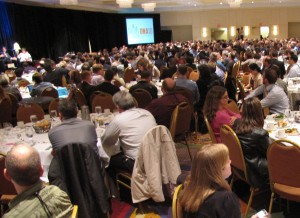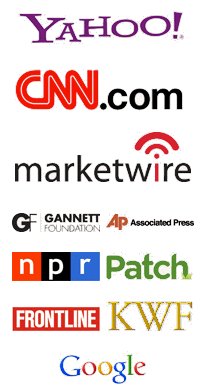A leadership duo from two of the world’s largest media companies said that continuous adaptation to a changing journalism market will make or break a news organization’s existence.
Tim Armstrong, CEO of AOL, told journalists at the ONA keynote luncheon today that one of the main concerns of media outlets is how to monetize online media, which requires a new economic business plan.

Hundreds of online journalists listen to NPR's Vivian Schiller and AOL's Tim Armstrong. Photo by Adrianna Amato/University of Missouri
“You better have a data plan about how you feed data to advertisers,” said Armstrong.
The other participant on the panel, which was moderated by Kara Swisher, co-executive editor of All Things Digital, was Vivian Schiller, president and CEO of NPR. She said media companies also have to pay attention to emerging media technologies, such as the iPad, a tablet style device released this April.
“It’s critically important for us to be where the audience seems to be going,” Schiller said. NPR tackles its digital audience with different user interfaces tailored to every device, like the iPad and iPhone.
According to Schiller the iPad app has been well received; 16 million people have downloaded it.
Because NPR as a news company evades much of the economic pressures, which have caused the collapse of legacy papers, the company will continue to offer its news applications for free.
As a more locally established media corporation, NPR retains its audience with less consumer costs than AOL. NPR relies on subscriptions from its member stations across the country and a steady audience it has built throughout the years. While both NPR and AOL have built a concrete online presence, AOL has taken a different approach compared to NPR in terms of investments in other media avenues.
Panelists also emphasized the importance of niche audiences.
NPR can be “niche” because of its relationship with the local community and “mass” because its organization empowers online users, said Schiller.
Tim Armstrong talked about AOL’s recently acquired TechCrunch and quickly expanding Patch and how these companies will expand AOL’s prominence on the online media scene.
One journalist asked what he said seemed to be on everyone’s mind: “Is Patch evil?” Laughter followed before Armstrong said, “If you think Patch is ‘evil’ put on your consumer hat for a while.”
Armstrong said Patch is responding to what AOL sees as consumer demand for hyper-local online news.
Patch’s recent hiring blitz this year has hit inner journalist circles.
It’s recruitment effort depends on individual journalism experience and a news intuition, said Armstrong after the forum. “Basically we’re going for a sort of best athlete model, which is how we find the best person for each community.”
